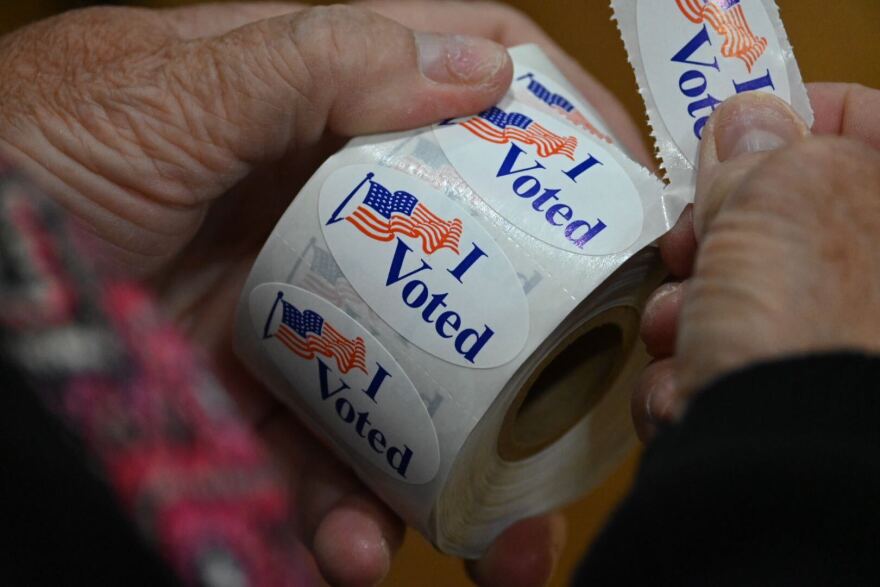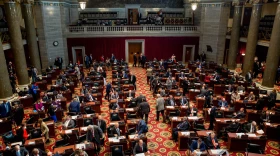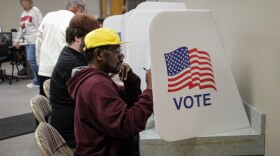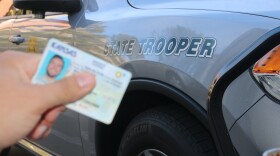Election 2022

Crysta Henthorne
/
KCUR 89.3
Missouri polling places are open from 6 a.m.-7 p.m.
Kansas polling places are open from 7 a.m.-7 p.m.
Voting is underway in Kansas and Missouri. With races for U.S. Senate, governor and much more on the ballot — plus major amendment votes on marijuana and police funding — it's shaping up to be a competitive midterm.
Election Day is on Nov. 8, 2022.
No matter which state you're voting from, KCUR wants to make sure you have all the information you need before you fill out your ballot. Below you'll find the most important guides, resources and stories for the 2022 election — plus interviews with candidates and spotlights on individual races.
All of the content below — and everything on our website — is available for free, always, no paywall or login needed. But if you want to support our journalism, you can become a member of KCUR here.
Voter tips
- Before you head to the polls, make sure you’re registered to vote. Voter registration deadlines have passed in both states, but you should double check your voter status in Missouri and in Kansas.
- Speaking of polling places, here’s where to find your voting location in Missouri and Kansas — plus early voting in the metro. Take note: Your polling place may have changed since the last time you voted.
- Both Kansas and Missouri now require photo ID to vote, and the accepted forms of identification differ in each state. If you don’t bring proper ID, you’ll have to cast a provisional ballot.
- Don't skip out on the judges retention section of your ballot. This year, there are 75 judges standing for retention votes in Kansas, and 52 judges on the ballot in Missouri. Since it can be one of the most confusing parts of the ballot, KCUR's Dan Margolies assembled this helpful guide to making an informed decision when voting for judges.
What you need to know about your ballot
-
Amendment 4, which will appear on the Nov. 8 ballot, asks Missouri voters to require Kansas City to increase funding for police.
-
Missouri voters will weigh in on Amendment 3 in the November 2022 election, which would legalize recreational marijuana statewide for adults over 21. How did that happen and what are the implications for Kansas residents if the measure passes?
-
Thanks to a Missouri law, voters must be asked every 20 years whether they would like to call a convention to amend the state constitution. But since the question started being asked in 1962, Missourians have never voted "yes."
-
Six of the seven justices on the Kansas Supreme Court face retention during the November general election. Conservatives who disagree with the ruling that concluded the state constitution includes the right to an abortion could try to change the court.
-
The proposed state constitutional amendment would create a legislative veto in Kansas, giving state lawmakers the ability to change rules and regulations set by the governor. Critics say it’s a power grab by Kansas Republicans.
-
Both Missouri and Kansas have non-partisan merit selection systems, although parts of both states still elect judges to office.
Latest election stories
-
Missouri Secretary of State Denny Hoskins, going against a century of precedent, declared that the Republican-favoring congressional map took effect Dec. 11, even though opponents had submitted enough signatures to likely force a statewide referendum.
-
Former state Sen. Bill Eigel has been criticized for receiving automatic contributions when he ran for governor and again when he launched his current bid for St. Charles County executive.
-
Some Republican election officials have broken with the president on nationalizing elections, even as they have avoided criticizing him directly. That includes Missouri Secretary of State Denny Hoskins, who also told lawmakers he wouldn’t provide the state’s full voter list to the feds without a court order.
-
Kansas lawmakers say that requiring driver's licenses to list legal status would reduce noncitizen voting — something that is exceedingly rare. One study says suspected cases happen just 0.0001% of the time.
-
After providing more than $100 million in free plays to lure customers, FanDuel and DraftKings, the sports books dominating the state market, paid no taxes.
-
The bill contains many provisions, including expanding the no-excuse absentee voting period.
-
The report uses Kansas and Arizona to illustrate the unforeseen financial costs of executing documentary proof of citizenship laws as they gain traction in Congress and statehouses nationwide.
-
In 1914, the Missouri Supreme Court held that once citizens submit signatures, the challenged law is automatically suspended until voters decide its fate.
-
Fred Sherman had served as Johnson County election commissioner since 2021. "I was given the option to resign or be terminated from the position, and I elected to resign," Sherman wrote on social media.
-
The U.S. Supreme Court appears ready to strike down parts of the Voting Rights Act that protects minority-majority congressional districts. Missouri Sen. Eric Schmitt said the St. Louis-based 1st Congressional District may be redrawn next.






















